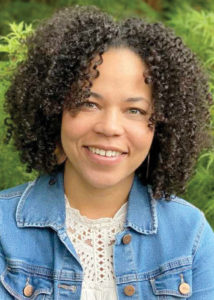Our Health and the Environment’s Health

Presented January 28, 2021
Gloria E. Barrera
I began testifying on environmental issues on behalf of the Alliance of Nurses for Healthy Environments (ANHE), and now frequently speak to local and federal policymakers advocating for policy to improve air quality. After testifying to elected officials in Washington DC for the first time back in 2016, I realized the unique and important voice nurses have when it comes to advocating for environmental health, and I have been invested in doing more ever since.
Healthy environments’ vitality to optimal health is examined very early in our academic careers in nursing school. The nursing profession’s identifying and understanding the link between the environment and health is rooted in the work of Florence Nightingale, who recognized and analyzed the impact of clean air and water. From my practice as a school nurse to testifying in Washington DC, I made it a priority to advocate on behalf of our most vulnerable populations. I was a proud 2020 American Climate Leadership Summit climate scholar. Nurses are in a unique position right now to amplify our voices and take direct action on climate change to protect public health. As an adjunct nursing professor, I am committed to helping future nurses understand the role that we have in addressing critical issues related to the environment and climate health.
One of my immediate professional goals last year was to facilitate the National Association of School Nurses (NASN), the preeminent professional organization for school nurses and the authoritative resource for evidence-based education policy advocacy and practice, in becoming a member of the Nursing Collaborative on Climate Change and Health. The Nursing Collaborative aims at building visible nursing leadership and addressing climate change as a health priority. I’m proud to say that NASN is now part of the collaborative. This gives school nurses the necessary tools and guidance needed to work on real climate change solutions, right where they are.
We already know that the COVID-19 pandemic has brought long-standing public health inequities into hyper-focus, and we know that vulnerable communities bear a greater burden of oil and gas pollution, which may also put them at higher risk from COVID-19. Our response to the pandemic must be through a holistic lens prioritizing vulnerable communities impacted by racism, health inequities, and air pollution.
We need to advocate to increase funding for public health programs, research, and regulatory actions to prevent environmental exposures and protect those who are at risk.
Eugenia Gibbons
 Healthcare Without Harm is a global nonprofit that works to transform healthcare worldwide by reducing the sector’s carbon footprint, helping hospitals become community anchors for sustainability, and driving action on climate change, so that the sector can be a leader in the global movement for environmental health and justice.
Healthcare Without Harm is a global nonprofit that works to transform healthcare worldwide by reducing the sector’s carbon footprint, helping hospitals become community anchors for sustainability, and driving action on climate change, so that the sector can be a leader in the global movement for environmental health and justice.
Gloria and I work in a sector that sits at the intersection of climate health and equity. Our hospitals in particular have been on the front lines of the COVID crisis. But even before that, sector leaders were charging forward with investments in energy efficiency and renewable energy, and setting ambitious decarbonization goals. They did this partly because there are significant economic benefits to doing so, but also because there’s a real opportunity for hospitals to contribute to the environmental resilience of the communities where they serve as anchor institutions.
When I was preparing for my talk, I was thinking about the many events of the last year—COVID-19, destruction caused by wildfires, and the racial reckoning occurring nationwide. All of these things reinforce the many structural inequities that exist in our country that were often put in place through policy, and which can be undone with good policy. If we don’t address these things, we will see the same communities who have been left most vulnerable to the COVID virus ravaged by climate change.
A possible silver lining from this past year is that there’s been a formal and very public recognition that racism itself and devastation caused by climate change, not only the pollution that it causes, are public health crises. In the absence of federal leadership in recent years, we have seen cities, state municipalities, local leaders, state leaders, and sector leaders step up to declare climate a priority and to work to engage some of these new voices to tell a compelling story about how the effects of climate change are realized every day in communities across the country.
The longer we take to shift the way we make and use energy, the way we prioritize community, health, and lives, and the way we see vulnerable populations, the harder it’s going to be to get over this climate hurdle in the future. We need to prioritize action now, set the ball in motion, take advantage of the opportunities that present themselves almost daily, and really learn from the hard lessons 2020 taught us.
Published in the Spring 2021 Humanist
